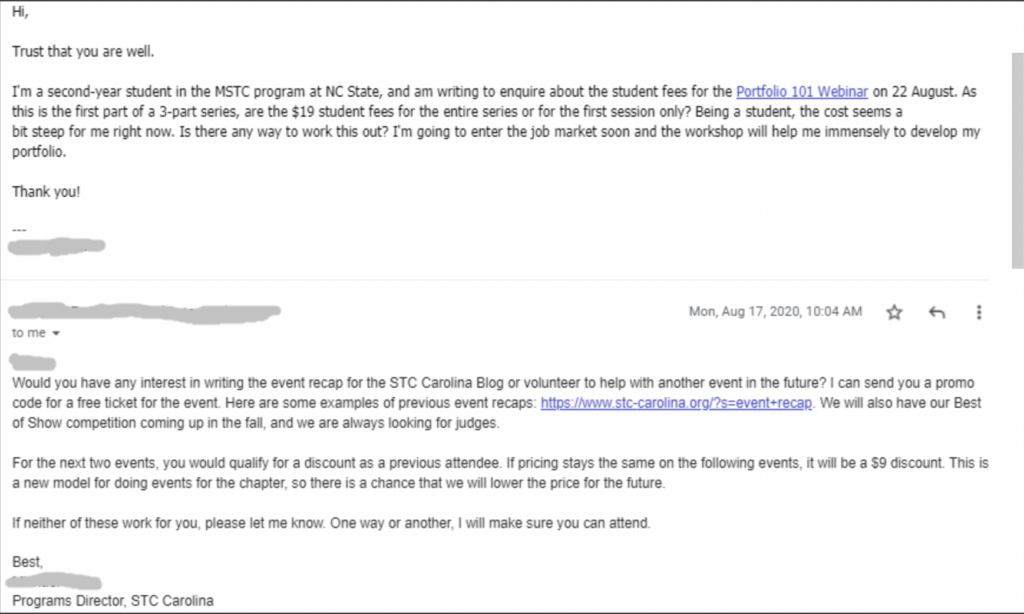By: Sayee Jadhav | March 13, 2021
Regardless of which university you attend in the United States, you will have multiple university and external resources that will help you get a job. Following are a few tips and university resources that you can use when applying for internships and full-time positions.
ATTEND WEBINARS THAT HELP YOU DEVELOP YOUR PORTFOLIO
Most occupations have a professional association that will host webinars/meetups for professional development. Connect with these professional communities and you will surely find some sessions catered to developing your resume, portfolio, and job search strategies. For example, STC Carolina caters to the advancement of technical communication and includes technical writers from the Carolinas conducting sessions for Professional Portfolio development. I volunteered to write the event recap: Recap Part I: Portfolio 101 Workshop andRecap Part II: Portfolio 101 Panel.
Most webinars have a nominal fee, but some STC chapters provide free tickets for students. You can also write to the organizers and request for volunteering work so that you can attend the workshop for free. (You might think this request would be strange/awkward, but trust me, there are many organizations and professionals willing to help only if you ask for help.) For example, STC Carolina conducted a 3-part series on Building an Online Portfolio for a nominal fee. I requested if I could volunteer in their workshop and get free attendance, and they were very helpful and more than willing to make concessions especially for students. See the following mail thread as an example:

REFINE YOUR RESUME AND WORK PORTFOLIO
Reach out to your professors and peers and request them to review your job application materials (resume, work portfolio, etc.). This will help to fine tune your portfolio, and some of them may also offer to provide recommendations and refer you to any job openings.
SEEK OUT MENTORS
Enroll with your university’s industry partnership program, if they have one. For example, NC State and IBM have partnered to form an IBM-NCSU Pathfinder mentoring program. I enrolled in the program, listed my current skills and the skills I needed mentoring in, and was partnered with a content strategist. Her mentoring helped me to gain industry insights, access to content strategy resources, and a medium to bounce my ideas off of. I must say, having a mentor/friend is extremely reassuring when you are in a foreign land.
ENROLL IN THE UNIVERSITY’S CAREER DEVELOPMENT PROGRAMS
There are a lot of short-term programs offered by the career center of most universities. For example, NC State’s Career Development Center provides short-term courses on job search strategies, negotiation skills, resume writing, and so on, that can help you immensely with your job search. For more information, see the Career Development Center site for NC State University.
START APPLYING EARLY
Start applying early, usually around 6 months before the intended job start date. This will help you to understand the job market, functioning of HR teams and hiring processes, refine your interviewing skills, prepare for tougher questions, tweak your job application strategy, cast a wider net, get more interview calls that culminate into multiple offers, and choose the job offer that you want. Basically, it’s “the early bird gets the worm” strategy.
PRACTICE THE 3-MINUTE PITCH
Practice pitching your profile in under 3 minutes. This is a fair time to briefly introduce your application, share your professional interests, and suggest how your skills suit the position that organizations are looking to fill. Learn the Three Minute Thesis (3MT) method, which is an academic competition that cultivates students’ presentation and research communication skills, and challenges them to describe their research within three minutes to a general audience. Only here, you are pitching your profile in an industry setting. Almost all universities have 3MT clubs, and attending the meetups or even watching past meetup videos helps immensely. For example, NC State’s 3MT group details are available here. This learning came handy when I attended the university’s job fairs and virtual interviews and I realized I could pitch my profile more fluently than before.
BUILD YOUR WRITING PORTFOLIO
The most common concern for students is how to develop a writing portfolio, if they do not have a relevant work experience. The best way to develop a writing portfolio is to find volunteering opportunities and use them to showcase your writing skills. For example, you can contribute to doc tasks for open source projects. Almost all open source projects accept docs contributions, and you will get a chance to learn new tools and technologies, different ways of documentation, collaborate with awesome technical folks, and contribute in a meaningful way.
Following are a few open source projects that writers can contribute to:
PARTICIPATE IN TECHNICAL WRITING COMMUNITIES
There are many technical writing communities that you can participate in. Most communities provide a lot of learning resources, discussions, guidance, and job postings and they are primarily set up on the Slack platform that allows for maximum collaboration.
Following are the communities that I find useful:
Best wishes and good luck in your job search!